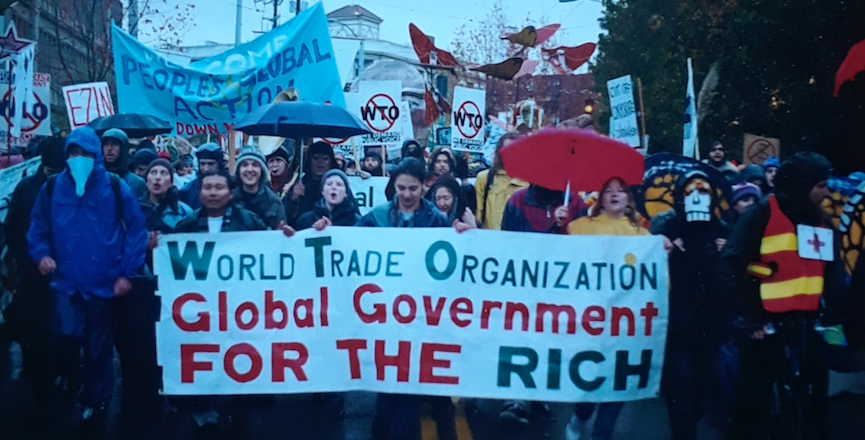The Trudeau government will be convening a meeting of trade ministers from 11 countries plus the European Union next month in Ottawa to discuss the “systemic challenges” now being faced by the 164-member World Trade Organization (WTO).
It is expected that Australia, Brazil, Chile, the European Union, Japan, Kenya, Mexico, New Zealand, Norway, Singapore, South Korea and Switzerland will attend the meeting.
Global Affairs Canada spokesperson Allison Lewis has told National Newswatch, “Canada is concerned about the future of the WTO as a lynchpin of the global rules based order.”
Neither the United States nor China has been invited to attend.
Bloomberg explains, “Since 2017 the Trump administration has refused to appoint and reappoint members to the appellate body, which has the final say in upholding, modifying, or reversing WTO rulings. If the U.S. continues its hold, the body will be paralyzed by late 2019 because it will lack the three panelists required to sign off on rulings.”
And Reuters notes, “China is widely seen as the principal target of Trump’s ire, so getting it to acquiesce to tougher WTO rules on subsidies, state-owned firms and preferential treatment could be key to achieving the ‘shape-up’ of the WTO that Trump has demanded.”
Another Reuters news article reports that Canada’s International Trade Diversification Minister Jim Carr wants the meeting to identify areas that the WTO can be “modernized” and that “Canada has already put forward suggestions on e-commerce, investment protection and accelerating trade with developing nations.”
On September 25, the Trudeau government released its paper “Strengthening and Modernizing the WTO”.
Bloomberg notes, “[It] addresses the WTO’s dispute settlement system and looks at ways to improve the organization’s ability to monitor international trade practices. It also seeks to modernize the WTO’s rules to address 21st century trade practices involving digital trade, international investment, domestic regulations, state-owned enterprises, industrial subsidies and trade secrets.”
The WTO was formally established in January 1995.
Of that formation, WTO critic Susan George has written, “The lobbyists of transnational corporations, who had long had the ear of official negotiators, rubbed their hands with glee: the WTO gave them the ideal tool to complete their globalisation and impose their own rules on all human activities now defined as objects of ‘trade’.”
On the eve of the ‘Battle in Seattle’ in November 1999, George also pointed out the lack of transparency in WTO adjudications.
She highlighted, “The conditions under which the WTO’s panels, which have settled more than 170 disputes, are appointed are obscure. The names of the ‘experts’, who meet behind closed doors and who hear no outside witnesses, are not made public.”
Back in March 2003 another WTO critic George Monbiot wrote, “[U.S. President] George Bush seems to be preparing to destroy the WTO at the next world trade talks in September not because its rules are unjust, but because they are not unjust enough. He is seeking to negotiate individually with weaker countries, so that he can force even harsher terms of trade upon them. He wants to replace a multilateral trading system with an imperial one.”
At that time Monbiot concluded, “Let us campaign not to scrap the World Trade Organisation, but to transform it into a Fair Trade Organisation, whose purpose is to restrain the rich while emancipating the poor.”
And this past July, long-time WTO critic Martin Khor wrote, “Under [the special treatment] principle, in talks to cut tariffs, developed countries have to cut by a higher percentage than developing countries, and the least developed countries (LDCs) need not reduce tariffs at all.”
He then expressed concerns that a reform of the WTO could “attempt to reduce the rights of the developing countries and even to entirely remove the principle of special treatment or even the status of ‘developing countries’ in the WTO.”
Khor has also cautioned, “The world is on the brink of a Trump-induced global trade crisis” and that developing countries need to work to “stop the trade war from escalating into a very big crisis that the world cannot afford to have.”
What might we conclude from these observations by prominent WTO critics?
The WTO is a deeply neoliberal, capitalist, and undemocratic institution that rightfully should be opposed, but that its dismantling by an imperial power would still preserve the harmful agenda of transnational capital rather than benefit the 99 percent.
Trump rejecting the WTO (or threatening to rip up NAFTA or withdraw from NATO for that matter) isn’t about acting in the interests of people and the planet (of course), it’s still about asserting US hegemonic power, just by other means.
Trudeau’s mission will not be to transform the WTO into a ‘Fair Trade Organisation’ (though he is not beyond making that rhetorical claim), but to salvage a neoliberal agenda that is deeply harmful and unjust to all but the one percent.
Brent Patterson is a political activist and writer.
Image: Brent Patterson
Help make rabble sustainable. Please consider supporting our work with a monthly donation. Support rabble.ca today for as little as $1 per month!




